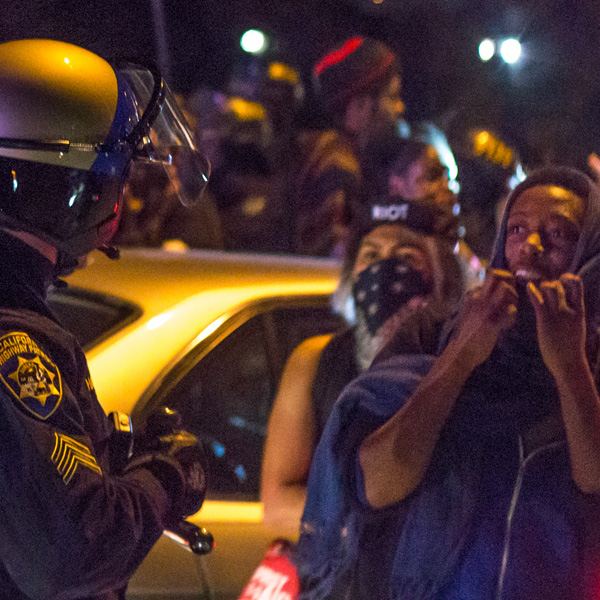In August 2014, the shooting death of Michael Brown, a young, unarmed Black man, by a White police officer in Ferguson, Missouri, sparked a new level of national discourse in the United States on race, civil rights, and systemic injustice. Within the last twelve months, similar cases involving the deaths of unarmed Black men and women such as Eric Garner, Tamir Rice, Walter Scott, Freddie Gray, and Sandra Bland have also ignited non-violent protests and rioting in response to excessive police violence. The UN Human Rights Commission has expressed concerns about racial profiling in the criminal justice system, including in law enforcement.[1]
An April New York Times article titled ‘1.5 Million Missing Black Men’ stated that ‘more than one out of every six black men who today should be between 25 and 54 years old have disappeared from daily life. Incarceration and early deaths are the overwhelming drivers of the gap.’[2] The absence of so many Black men in public life has, among other serious consequences, destabilized the health and economic wellbeing of women, children, and families.
Black Lives Matter
These traumatic events have finally dispelled the notion that the US is a post-racial, post-Civil Rights nation. The two-term election of Barack Obama, America’s first Black president, has not signaled the end of institutionalized racism. As a people, Black Americans have not overcome. We are still experiencing the effects of racism.
One of the basic messages that has emerged during our nation’s focus on the injustices and pain Black Americans face is the hashtag #BlackLivesMatter. While many political conservatives take issue with the liberal political platform of the Black Lives Matter movement, the sentiment resonates deeply with Black Americans and, increasingly, non-Black Americans, particularly in situations where the evidence appears contrary.
In search of the church
After the Michael Brown shooting, denominations issued statements and Christian leaders wrote blog posts, but churches as a whole—especially majority-White churches—were quiet regarding systemic injustice. Given the historic complicity of majority-culture churches on issues of race and civil rights, the silence was not surprising.
Nearly 250 years of legal slavery in the US created deeply entrenched power structures and stereotypes. Another 100 years of segregation—separate communities, churches, schools, drinking fountains—led to the Civil Rights movement, with Black Americans still fighting for basic human rights. The years and layers of injustice and separation have left many White Americans unaware of the economic, social, and educational advantages that are theirs because of their skin color, and often disbelieving of the oppression Black people face daily.
Although there does seem to be some recognition among churchgoers that diversity is good, little has actually been done over the years to pursue it. A 2010 survey of evangelical Protestant congregations revealed that only 13.7% of Protestant churches in the US have any marked diversity.[3]
Even diverse churches are not talking about systemic injustice. In The New Evangelical Social Engagement, Gerardo Marti and Michael Emerson cite a study on multiracial churches that found that ‘even in multiracial congregations—especially but not exclusively those led by white pastors—the present-day realities of race, addressing issues of racial inequalities, or even talking about possible racial conflicts that might arise in the church were off limits, deemed unimportant to the true work of the church or too potentially explosive.’[4]
There are signs of hope, however. The Southern Baptist denomination issued a call for repentance and an end to racial division.[5] And the PC-USA denomination recently accepted a personal resolution on civil rights, which was referred to the June 2016 General Assembly. In preparation for that future meeting, they are encouraging presbyteries to consider all sins of racial prejudice and the pursuit of proper action.[6]
At a time when there has already been a mass exodus from the evangelical church, particularly among young adults, and with many older Americans also experiencing higher levels of disengagement from organized religion, inaction by church leaders could further erode the relevance and credibility of White evangelical Christians, especially among Millennials.[7],[8]
Charleston impact
Millennial Activists United (MAU) has noted the tendency of the Black church, as a whole, to remain silent on issues of systemic oppression and racism as well.[9] However, on June 17, 2015, nine members of the historic Emanuel African Methodist Episcopal Church in Charleston, South Carolina, including Pastor Clementa Pinckney, a state senator, were massacred during an evening prayer meeting by a 21-year-old White supremacist. In that moment, the pain and violence of racism and systemic injustice were literally unleashed within the four walls of the church.
Two days later, at the bond hearing for the shooter, several relatives of the murdered victims expressed forgiveness for the shooter and concern for his salvation. People were amazed that the families would offer forgiveness so quickly. Certainly, their words bore witness to the power of the gospel and the power of love to overcome hatred.
Following the killings, Republican South Carolina Governor Nikki Haley successfully called for the removal of the Confederate flag from the State Capitol, arguing that ‘a symbol long revered by many Southerners was for some, after the church massacre in Charleston, a “deeply offensive symbol of a brutally offensive past.”’[10] Far beyond the geographical boundaries of South Carolina, many Americans are hoping this tragedy will result in more substantive changes and serve as a turning point in America’s narrative of racism and systemic injustice.
Significance for global mission
As we engage the significance of ethnic conflict and systemic injustice for global mission, there is an existing Lausanne paper that is an invaluable resource. In September 2004, the Lausanne Forum for World Evangelization was held in Pattaya. One of the 31 issue groups—comprising 47 Christian leaders from 6 continents and 21 countries—gathered in a spirit of Christian unity to discern and debate the work of reconciliation. The Occasional Paper they produced after two years of intense work was presented in an act of public worship at the gathering, which included a foot-washing service with representatives from some of the world’s most conflict-ridden locations. In that same spirit of hope, several highlights from the paper could act as a framework for the global church as we seek to be a prophetic voice in our fractured world.[11]
Embrace reconciliation as central to the gospel
Reconciliation is at the heart of God’s global mission: 2 Corinthians 5:18-20 states that God has reconciled the world to himself through Christ and has ‘committed to us the message of reconciliation’. As the Lausanne paper states: ‘This work of becoming peacemakers between divided peoples is not secondary or optional, but is central to Christian mission along with planting churches and making disciples.’[12] Participating in God’s mission implicitly means living as reconcilers in the world.
Throughout our almost 75-year history, InterVarsity Christian Fellowship/USA has had a rich legacy of ethnic reconciliation and justice, but in this past year we sensed the need to better articulate the message and work of reconciliation as a critical aspect of our core mission with college students and faculty. As we engage in the work of evangelism, discipleship, and growing campus fellowships, we are wrestling with how we can both impart and embody the blessing and necessity of reconciliation as a central theme of the gospel.
Name the truth about the past as a means of moving forward
The Lausanne paper states: ‘In response to God’s love and justice . . . Christians are called to fearlessly seek and name the truth of what has happened, guided by repentance and forgiveness. This must involve seeking shared truth across divided lines.’[13] Because historical truth is composed of personal and communal stories, and because we have different experiences, different interpretations of truth, and different narratives, it is difficult to name the ‘full’ truth. However, with courage, grace, and perseverance, we can build a common story as we intentionally create spaces in which the full truth can be named, told, heard, and lamented—places where people who have been deeply wounded by the sins of racism and systemic injustice learn to see the common humanity of each other, made in the image of God, and to empathize with each other’s pain.
However, we must also be willing to take the next steps of confession, of repentance, and of offering and receiving forgiveness. It is through the hard work of these steps that we are able to experience the healing and restoration of the Holy Spirit.
Pursue cross-cultural partnership and engagement
Again, the Lausanne paper explains: ‘While confession or forgiveness can come from one direction, reconciliation between divided peoples requires a risky, mutual journey of intentional relationship-building in which all groups are transformed and called to costly sacrifices.’[14] Throughout Scripture, we see Jesus crossing social, ethnic, and gender barriers for the sake of the gospel. Jesus’ deliberate crossing of the historic divide between Jews and Samaritans set a powerful example for his disciples. In John 4, he intentionally pursues a conversation with a disenfranchised Samaritan woman and offers her the gift of living water. When the woman later shares about her transformational encounter with others in her community, many others also accept the gospel.
One way InterVarsity follows Jesus’ example of crossing historic divides is through our triennial Multiethnic Staff Conference. Earlier this year, as Asian American, Black, Latino, Middle Eastern, Multiracial, Native American, and White people, we grieved the pain of recent racial incidents and the brokenness felt in other ethnic communities and cried out to the Lord with prayers of lament. It was there at the altar in our lament that we experienced the redemptive work of the Holy Spirit. Through the proclaimed Word, we were reminded—and together affirmed—that every person has been made in the image of God, and that it is in the richness of our diversity that we reflect the fullness of God.
At a moment in history filled with racial division and brokenness, it can be tempting to adopt a mindset of despair and view the barriers as insurmountable. Yet, some Christian leaders are discerning that this is a kairos moment, a divinely inspired moment when change is possible. As those who are committed to reconciliation, we must envision a future that is better than the present. For some, our actions may improve the lives of millions or thousands. For others, it may mean touching one life at a time. However, for all of us—brothers and sisters empowered by the Spirit of God—it means investing our individual lives and corporate efforts in practical acts of restorative justice that change the world.
Endnotes
- Amnesty International, ‘Mass Incarceration in the USA’, http://www.amnestyusa.org/our-work/issues/military-police-and-arms/police-and-human-rights/mass-incarceration-in-the-usa.
- Justin Wolfers, David Leonhardt, and Kevin Quealy, ‘1.5 Million Missing Black Men’, The New York Times, 20 April 20 2015, http://www.nytimes.com/interactive/2015/04/20/upshot/missing-black-men.html?emc=edit_th_20150421&nl=todaysheadlines&nlid=47450734&_r=1&abt=0002&abg=0.
- Cited in Gerardo Marti and Michael O Emerson, ‘The Rise of the Diversity Expert: How American Evangelicals Simultaneously Accentuate and Ignore Race’, in The New Evangelical Social Engagement, ed Brian Steensland and Philip Goff (New York: Oxford University Press, 2014), 179-80.
- Ibid, 190.
- Emma Green, ‘Southern Baptists and the Sin of Racism’, The Atlantic, 7 April 2015, http://www.theatlantic.com/politics/archive/2015/04/southern-baptists-wrestle-with-the-sin-of-racism/389808/.
- ‘PCA General Assembly Refers Resolution on Civil Rights Remembrance to the 44th GA’, The Aquila Report, 12 June 2015, http://theaquilareport.com/pca-general-assembly-refers-personal-resolution-on-personal-resolution-on-civil-rights-remembrance-to-the/.
- Andy Johnson, ‘The Gap Got Too Big’, Restoration Thoughts: Thinking Differently About Christianity in America, 25 March 2014, https://andyjohnson2013.wordpress.com/2014/03/25/the-gap-got-too-big/.
- Editor’s Note: See article by Steve Steddom and Thomas Harvey entitled ‘The Millennials: How to engage them in missional giving’ in the November 2014 issue of Lausanne Global Analysis.
- Jamil Smith, ‘Does the Black Church Need to Lead the Ferguson Movement?’ New Republic Magazine, 6 April 2015, http://www.newrepublic.com/article/121466/does-black-church-need-lead-ferguson-movement.
- Frances Robles, Richard Fausset, and Michael Barbaro, ‘Nikki Haley, South Carolina Governor, Calls for Removal of Confederate Battle Flag’, The New York Times, 22 June 2015, http://www.nytimes.com/2015/06/23/us/south-carolina-confederate-flag-dylann-roof.html.
- Chris Rice, ed, ‘Reconciliation as the Mission of God: Christian Witness in a World of Destructive Conflicts’, Lausanne Occasional Paper no 51, Lausanne Committee for World Evangelization, 2005, https://lausanne.org/content/lop/lop-51.
- Ibid, 17.
- Ibid, 13.
- Ibid, 18.

